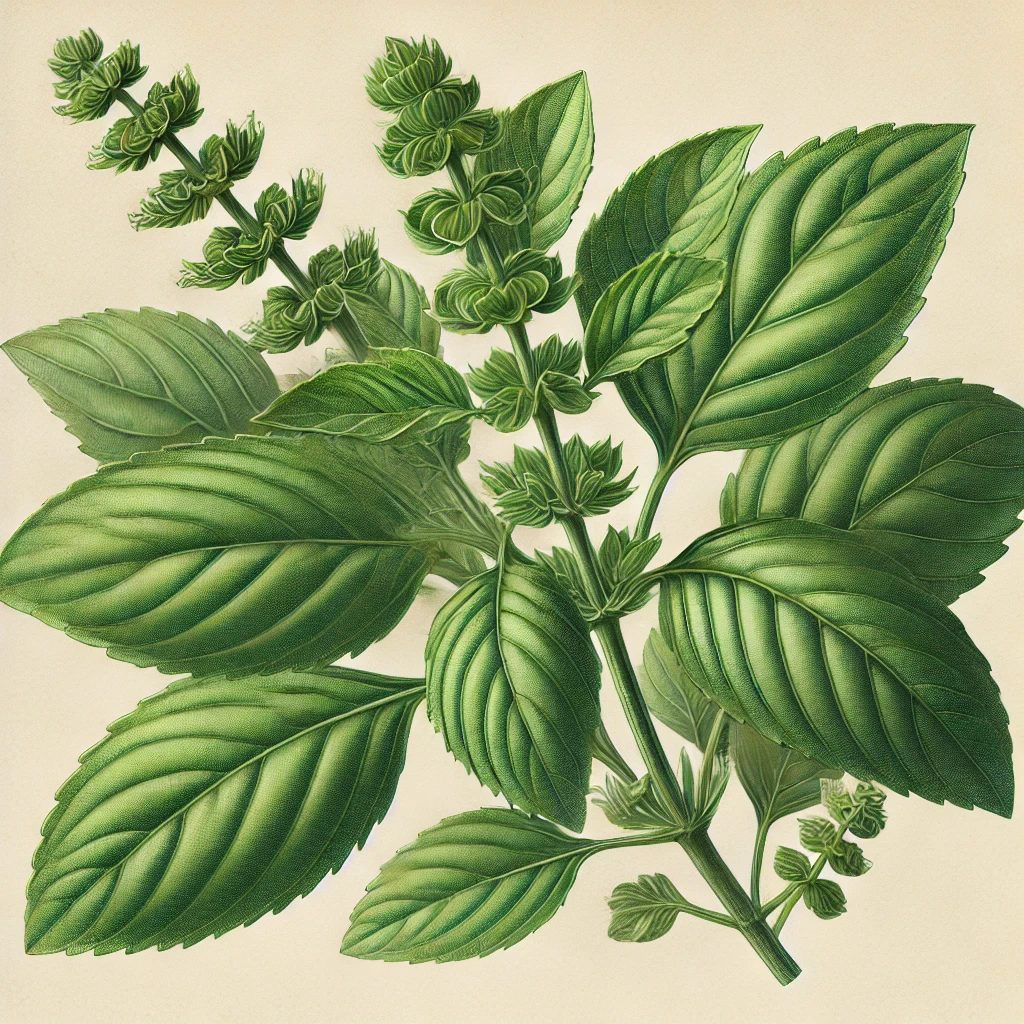Basil, Sweet Basil (Ocimum basilicum): A Versatile Herb for Culinary and Medicinal Use

Overview
Sweet Basil (Ocimum basilicum) is a fragrant culinary herb known for its medicinal properties and rich essential oil content. Its leaves are used in traditional medicine to treat digestive issues, infections, and inflammation. Basil’s active compounds, including eugenol and estragole, provide antimicrobial, anti-inflammatory, and antioxidant effects. This herb is widely used for culinary flavoring, while its extracts have applications in traditional remedies for respiratory and digestive health.
Medicinal Activity
Basil exhibits a range of medicinal properties, including:
Antibacterial and Antiseptic: Effective against various bacteria, supporting immune health and skin infections.
Anti-inflammatory: Reduces inflammation, making it helpful for joint and muscle pain.
Antioxidant: Neutralizes free radicals, promoting cellular health and slowing aging.
Digestive Aid: Acts as a carminative, reducing gas and bloating.
Aphrodisiac: Traditionally believed to enhance mood and libido.
Sedative: Has mild calming effects, useful for stress and insomnia.
Antibacterial and Antiseptic: Effective against various bacteria, supporting immune health and skin infections.
Anti-inflammatory: Reduces inflammation, making it helpful for joint and muscle pain.
Antioxidant: Neutralizes free radicals, promoting cellular health and slowing aging.
Digestive Aid: Acts as a carminative, reducing gas and bloating.
Aphrodisiac: Traditionally believed to enhance mood and libido.
Sedative: Has mild calming effects, useful for stress and insomnia.
Therapeutic Indication
Basil has been traditionally used to manage a variety of health conditions, including:
Digestive Disorders: Relieves symptoms of dyspepsia, gas, and bloating.
Respiratory Conditions: Used as an expectorant for coughs, colds, and bronchitis.
Skin and Wound Care: Applied topically for acne, insect bites, and minor wounds due to its antiseptic properties.
Joint and Muscle Pain: Provides relief in cases of arthritis and muscle soreness.
Mental Health and Stress: Known to help alleviate mild depression, nervousness, and insomnia.
Digestive Disorders: Relieves symptoms of dyspepsia, gas, and bloating.
Respiratory Conditions: Used as an expectorant for coughs, colds, and bronchitis.
Skin and Wound Care: Applied topically for acne, insect bites, and minor wounds due to its antiseptic properties.
Joint and Muscle Pain: Provides relief in cases of arthritis and muscle soreness.
Mental Health and Stress: Known to help alleviate mild depression, nervousness, and insomnia.
Prepration & Usage
Basil can be used in various forms, suitable for both internal and topical applications:
Tea:
Dosage: 1–2 tsp of dried basil leaves per cup of hot water. Steep for 10–15 minutes, and drink 2–3 times daily.
Tincture:
Dosage: 0.5–1 tsp of basil tincture up to 3 times daily.
Topical Application:
Preparation: Basil oil or a fresh leaf paste can be applied to insect bites, acne, and minor wounds.
Tea:
Dosage: 1–2 tsp of dried basil leaves per cup of hot water. Steep for 10–15 minutes, and drink 2–3 times daily.
Tincture:
Dosage: 0.5–1 tsp of basil tincture up to 3 times daily.
Topical Application:
Preparation: Basil oil or a fresh leaf paste can be applied to insect bites, acne, and minor wounds.
Safety & Considerations
While basil is generally safe, certain considerations are necessary:
Pregnancy and Nursing: Avoid large amounts or basil essential oil due to estragole content, which may have mutagenic effects in high concentrations.
Long-Term Use: Not recommended for extended use in large amounts or for infants, due to potential risks associated with essential oil content.
Carcinogenic Potential: Estragole in basil oil has shown potential carcinogenic effects in animal studies; limit basil oil use until further research confirms safety.
Pregnancy and Nursing: Avoid large amounts or basil essential oil due to estragole content, which may have mutagenic effects in high concentrations.
Long-Term Use: Not recommended for extended use in large amounts or for infants, due to potential risks associated with essential oil content.
Carcinogenic Potential: Estragole in basil oil has shown potential carcinogenic effects in animal studies; limit basil oil use until further research confirms safety.
Conclusion
Sweet Basil is a versatile herb celebrated for its culinary and medicinal applications. With antibacterial, anti-inflammatory, and antioxidant properties, it supports immune health, digestion, and mental well-being. Although basil is safe in moderation, basil oil and long-term use of large amounts should be approached with caution due to potential health risks associated with estragole.
